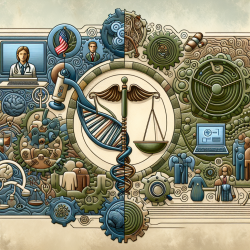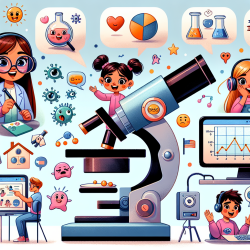Enhancing Practitioner Skills with Epigenetic Insights

Epigenetic research, especially its applications in military, defense, and security contexts, offers valuable insights that can be adapted to enhance skills in various fields, including special education and online therapy services like those provided by TinyEYE. The recent article, "Defusing the legal and ethical minefield of epigenetic applications in the military, defense, and security context," provides a comprehensive analysis of these applications, highlighting both their potential and the ethical challenges they pose.
Understanding Epigenetic Technologies
Epigenetics involves the study of biochemical changes that affect gene activity without altering the DNA sequence. These changes can provide insights into how environmental factors and life experiences influence biological functions. The article discusses three primary epigenetic technologies:
- Epigenetic Clocks: Tools like GrimAge that estimate biological age and predict health outcomes.
- Epigenetic Signatures: Biomarkers that can indicate exposure to trauma or disease risk.
- Epigenetic Editing: Techniques that modify gene expression to potentially enhance physical and psychological resilience.
Applications in Special Education and Therapy
While the military applications of these technologies are intriguing, their principles can also be applied to improve educational and therapeutic practices. Here are some ways practitioners can implement these insights:
Personalized Interventions
Epigenetic profiling can help identify individual differences in students' responses to various educational strategies. This knowledge allows for the development of personalized intervention plans that cater to each student's unique needs.
Monitoring and Support
Epigenetic clocks and signatures can be adapted to monitor students' stress levels and mental health. By identifying early signs of stress or trauma, practitioners can provide timely support and interventions to improve students' well-being.
Ethical Considerations
As with any new technology, ethical considerations are paramount. Practitioners must ensure that data privacy is maintained and that interventions are evidence-based and ethically sound. This includes obtaining informed consent and being transparent about how epigenetic information will be used.
Encouraging Further Research
The potential benefits of epigenetic technologies are vast, but they also require careful consideration and further research. Practitioners are encouraged to stay informed about the latest developments in epigenetics and to consider how these insights can be ethically integrated into their practice.To read the original research paper, please follow this link:
Defusing the legal and ethical minefield of epigenetic applications in the military, defense, and security context.
Citation: Dalpé, G., Huerne, K., Dupras, C., Cheung, K., Palmour, N., Winkler, E., Alex, K., Mehlman, M., Holloway, J. W., Bunnik, E., König, H., Mansuy, I. M., Rots, M. G., Erwin, C., Erler, A., Libertini, E., & Joly, Y. (2023). Defusing the legal and ethical minefield of epigenetic applications in the military, defense, and security context. Journal of Law and the Biosciences. https://doi.org/10.1093/jlb/lsad034










